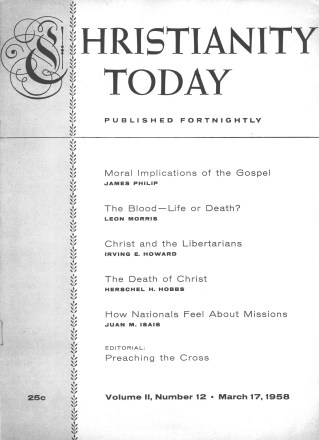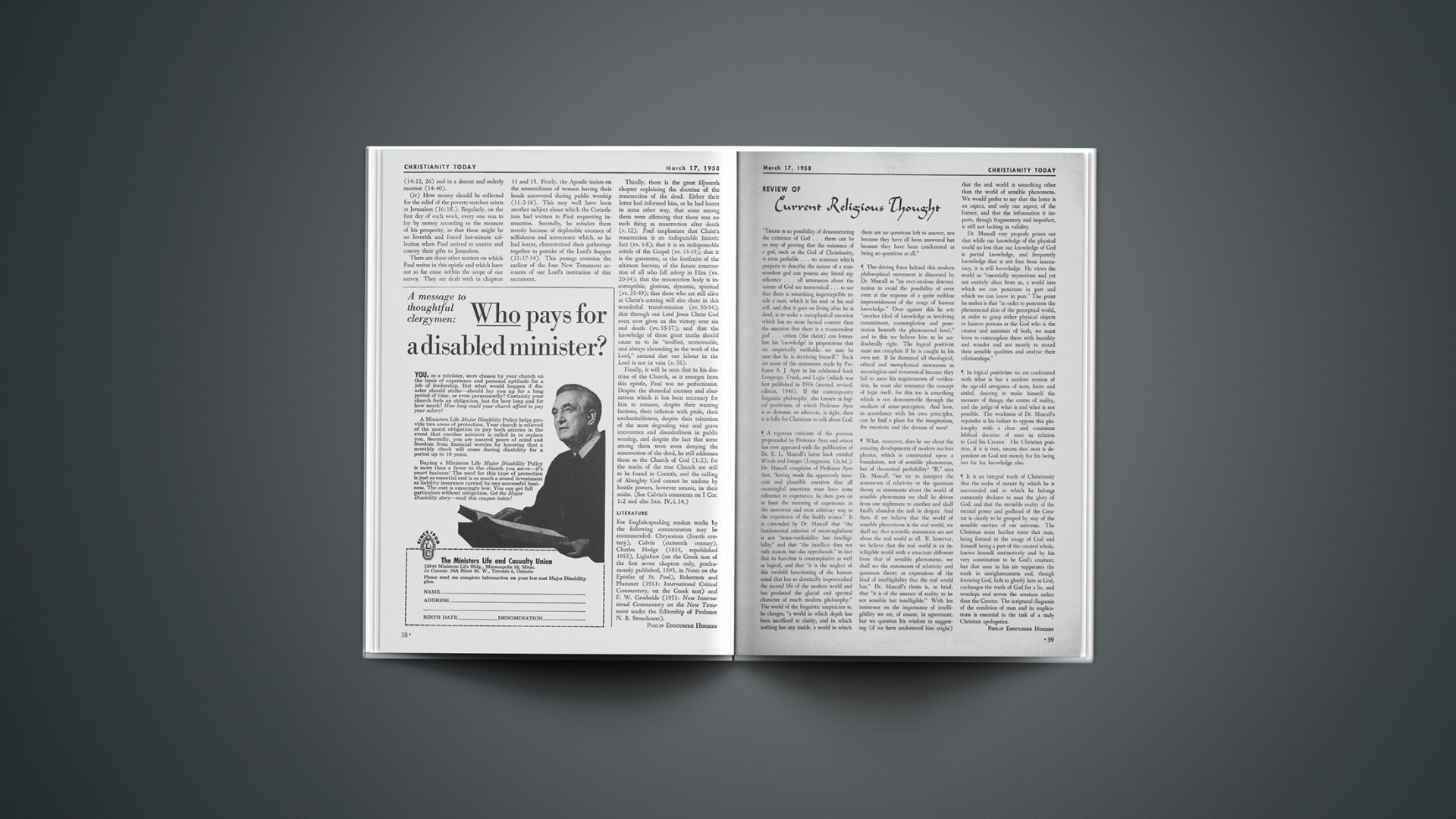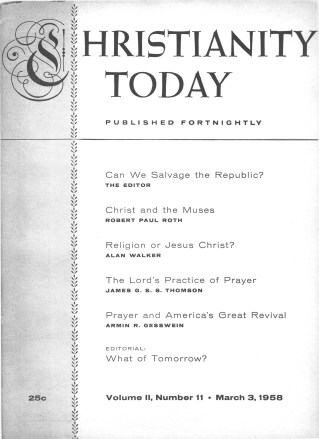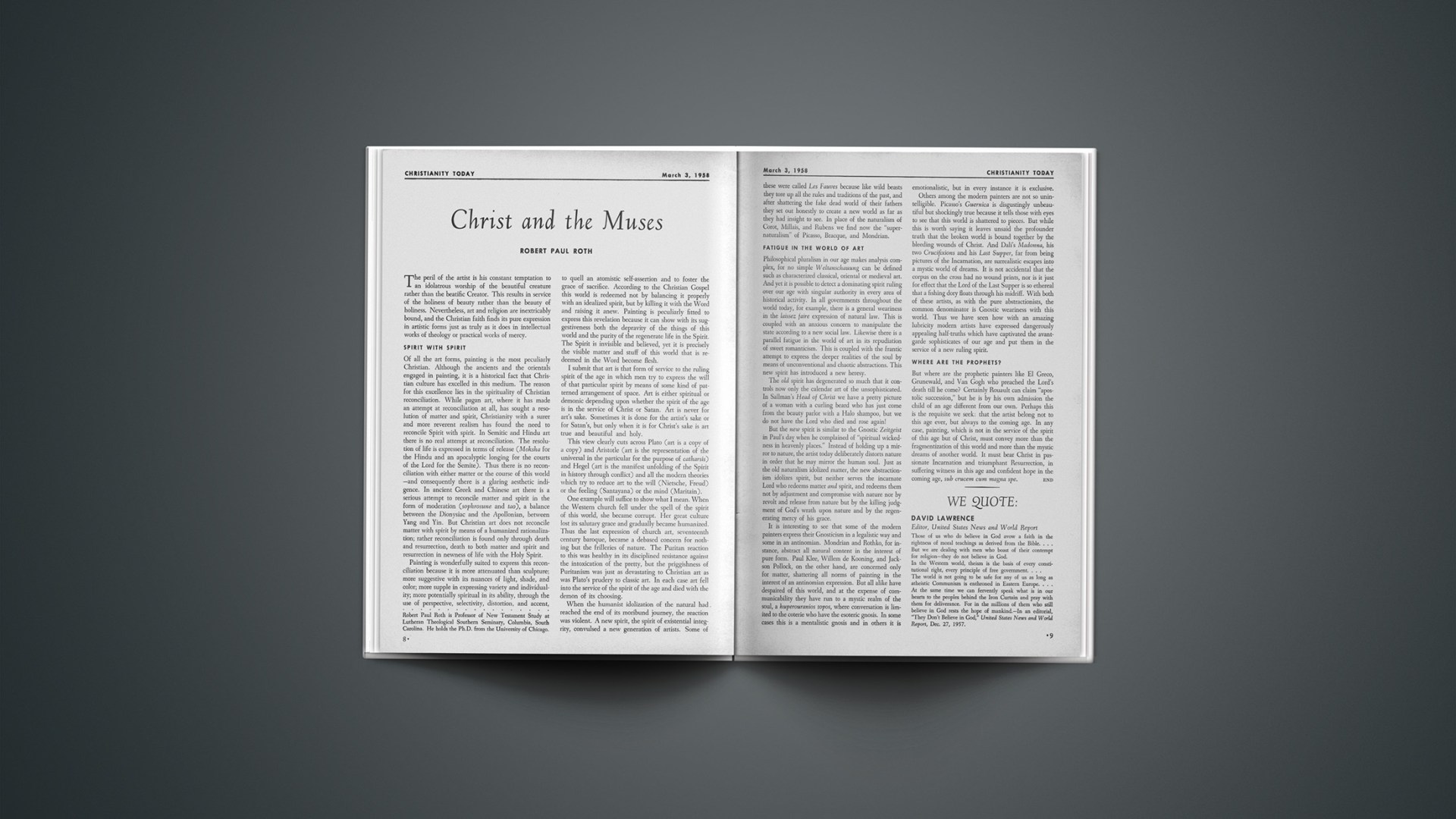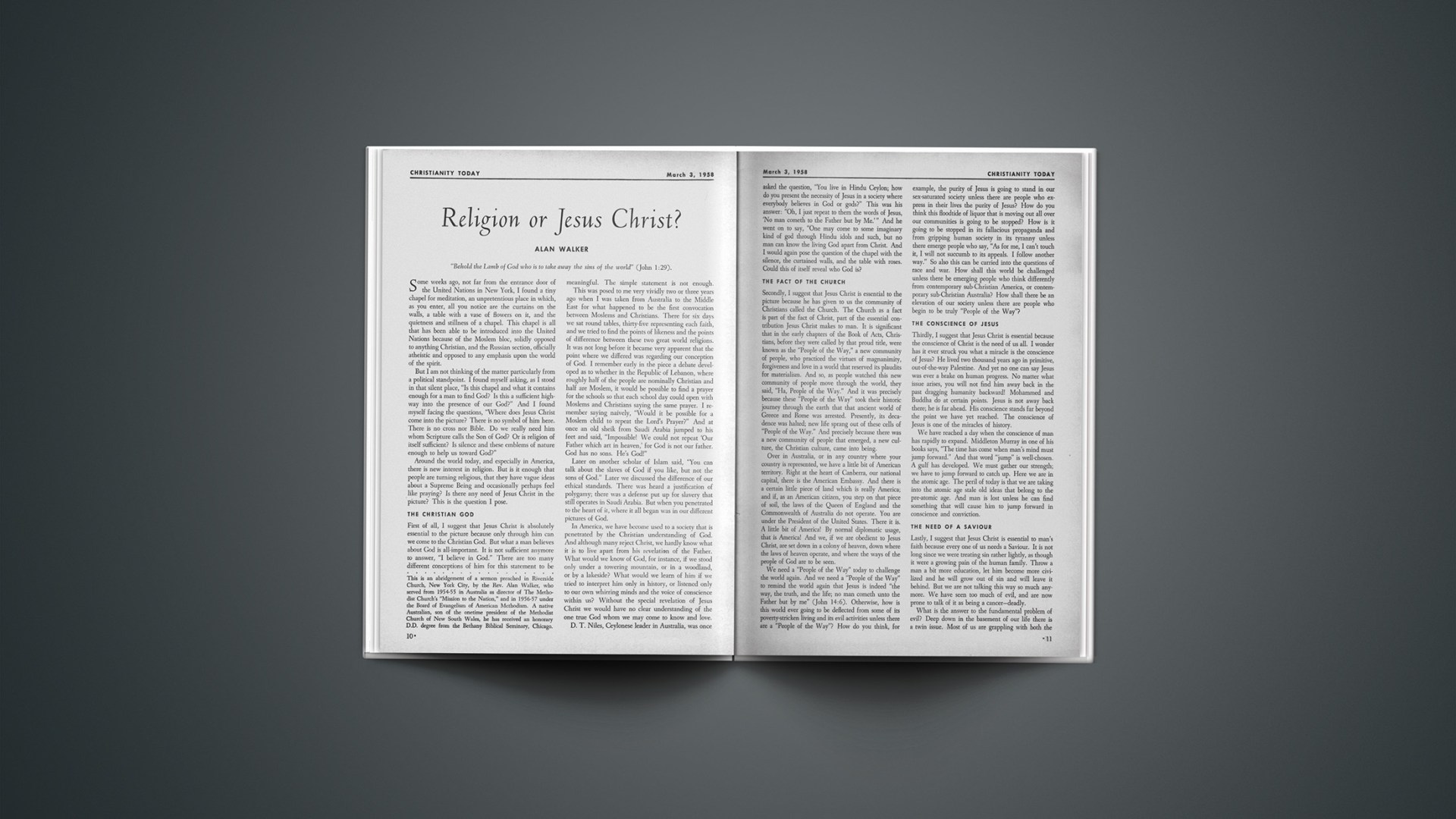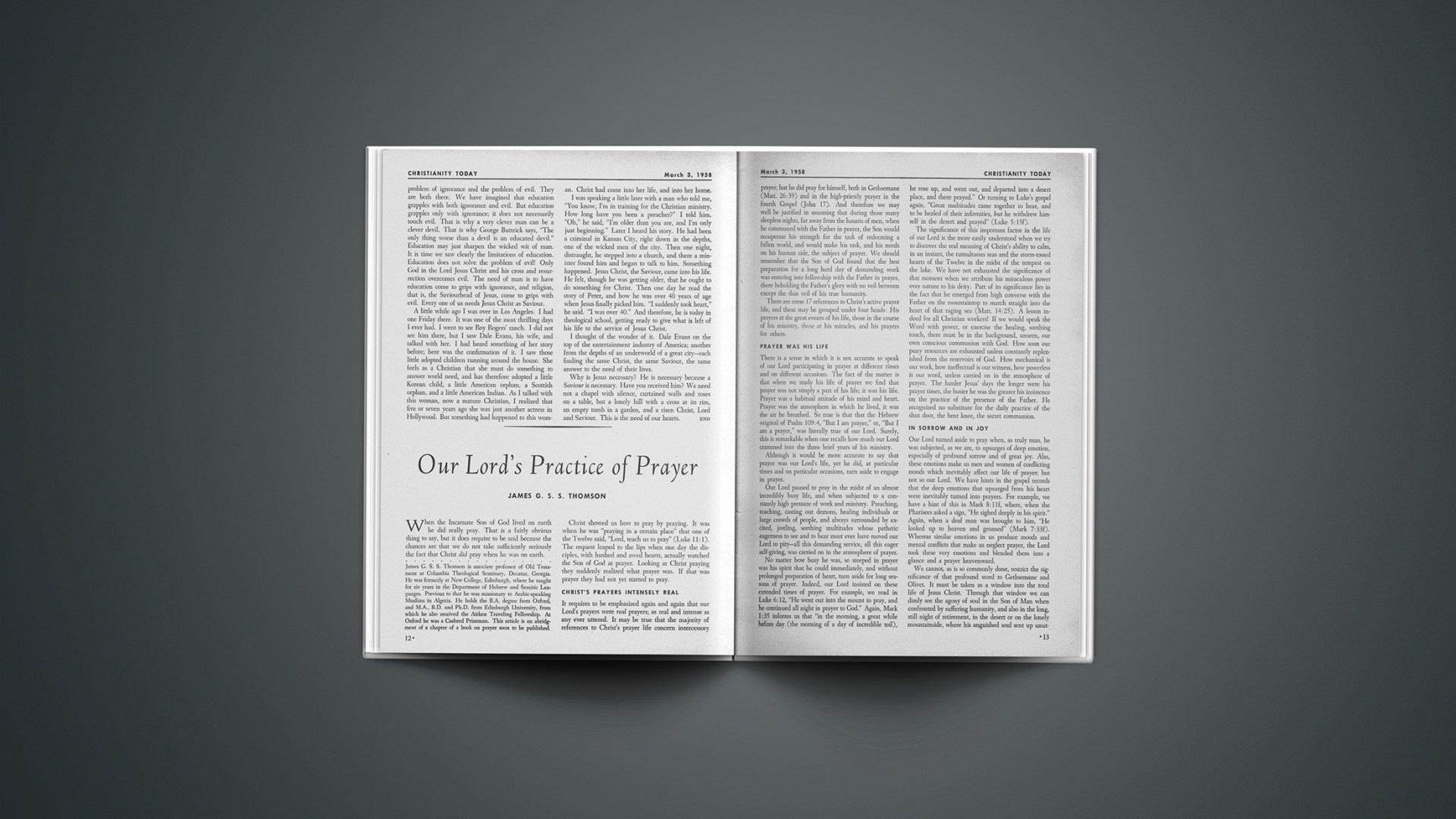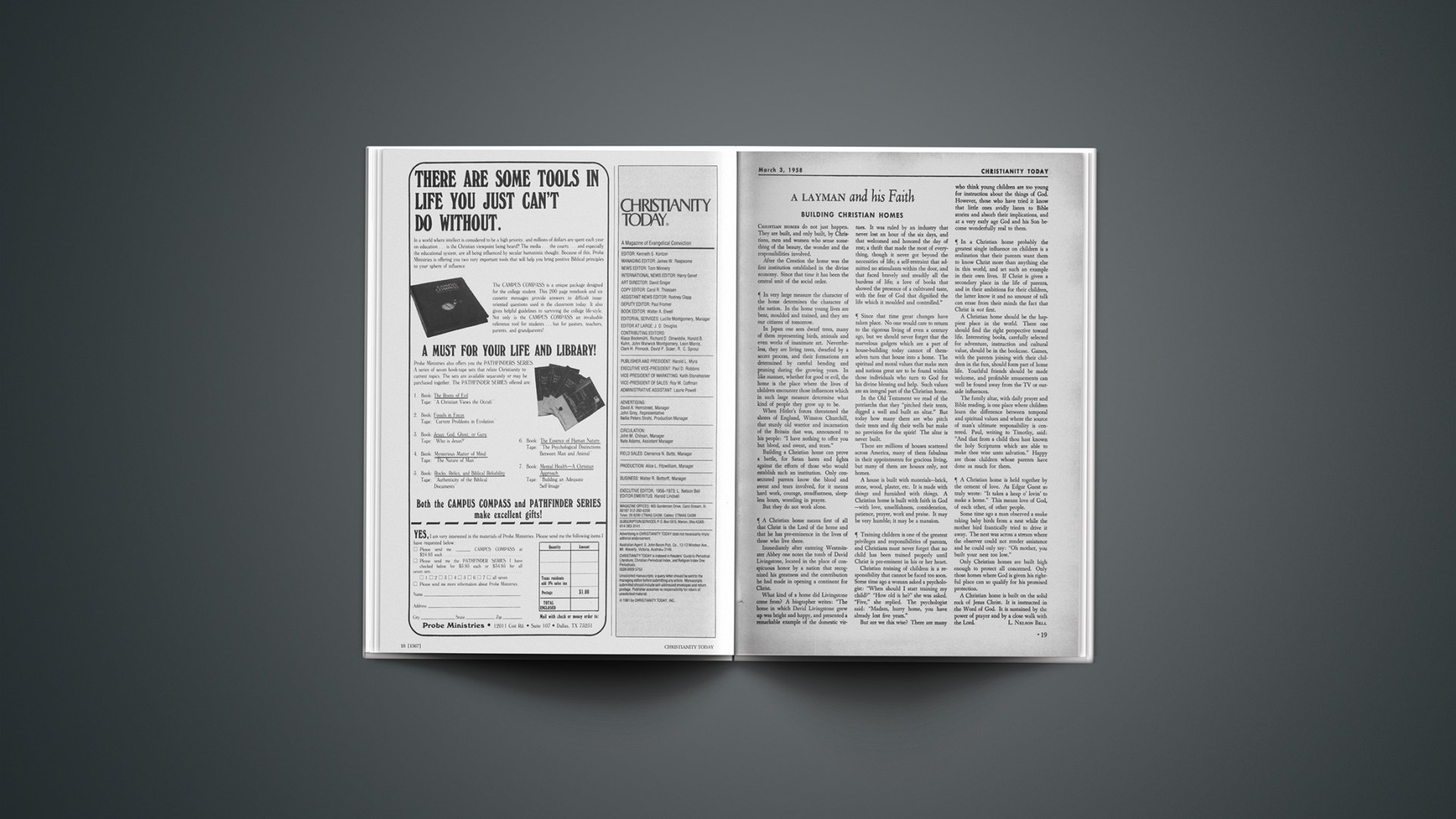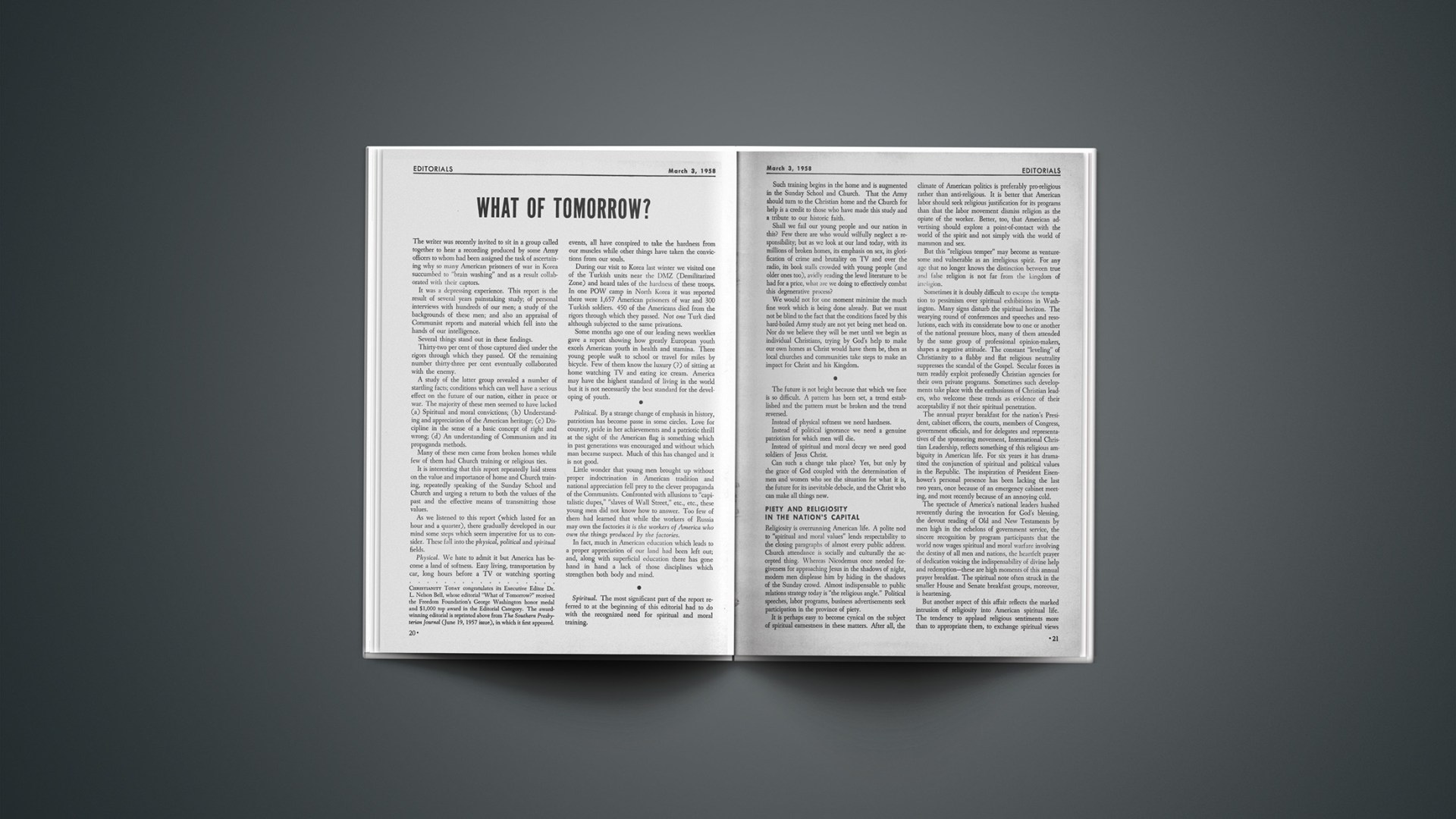New York Crusade
God in the Garden, by Curtis Mitchell, Doubleday, 1957. 195 pp., $2.50.
This is an immediate, on-the-scene report of the biggest mass evangelism drive in Christian history, and it has the swift, crackling flavor of good journalism. No doubt time will bring further light to bear on the 1957 phenomenon of Billy Graham and his New York crusade, but for the present, this book ably tells the story, in its many facets, as it happened.
Mr. Mitchell, a polished feature writer for the American Weekly, has done a fine job of pulling together all the varied strands of the vast undertaking, and weaving them into a smooth, vivid pattern.
He roves over the whole complex anatomy of the campaign, its planning, participants, proceedings, its colorful sidelights, its partisans and critics and the response of press and public. A personal diary of Mr. Graham himself provides some of the most unusual, revealing passages in the volume. Excerpts from the diary are sprinkled throughout, showing Mr. Graham’s feelings as the effort progressed.
For instance, before the crusade began, Mr. Graham, at his rural mountaintop home in North Carolina, wrote wistfully that he wished the Lord would just let him stay there the rest of his life and never go to New York. “All the forces of hell will probably be turned on us,” he wrote. He lamented the “concentration of publicity around my name … This gaze on me and our team must be shifted to the person of Christ … God will not share his glory …”
The evangelist also tells how at first, when his work was lampooned or denounced by others, he was “tempted once or twice to lash back. But then scores of scriptures began to echo in my ears … Gradually the spirit of God shed abroad in my heart an everwhelming love for these brethren … I have thanked God a thousand times … that he gave me the grace … never to answer back.”
In the book, Mr. Mitchell does not attempt any settled appraisal of the crusade, or long-range conclusions. But he clearly points it up to a spiritual manifestation of unprecedented proportions in our time.
The author himself carefully stays in the background, relying on statements and actions of others, and brisk, graphic description to give the picture.
As a result, and as in most writing about contemporary events, the book is heavily laded with quotations from newspapers and individuals, and with portions of letters from unnamed persons who made “decisions for Christ.”
The volume begins with a rapid-fire, stacatto recitation of the crusade’s record-setting statistical scope, then moves into detailed accounts of its varied aspects.
A short biography of Graham himself is also given … his uneasiness prior to the crusade; the complex organizational preparations, the widespread prelude of prayer, the opening, the “team” members, the volunteers, the broadcasts, the special meetings in Times Square and elsewhere and the crusade’s unslacking pace.
Mr. Mitchell provides some nice vignettes of Graham as he moves through the whole process, at news conferences, on radio and TV shows, in telephone calls, at luncheons, meetings and in public and in private.
One of the best chapters is devoted to a Graham sermon on the spiritual chemistry of conversion.
GEO. W. CORNELL
The Sovereign God
The Five Points of Calvinism, Sovereign Grace Book Club, Evansville, Indiana, 1957. $3.95.
Among the writers whose works appear in this book are two Presbyterians, two Baptists, one Reformed, and one Congregationalist minister. The first major section presents a general discussion of the famous “five points” which distinguish Calvin’s distinctive doctrines from those of the rival system, Arminianism: Total Inability, Unconditional Election, Limited Atonement, Irresistible, Efficacious Grace, and Perseverance of the Saints.
The first major section is from the pen of Horatius Bonar, a Scottish Presbyterian minister and hymn writer. Andrew Fuller (1754–1815), a Baptist minister in England, treats the doctrine of Total Depravity. The discussion of Unconditional Election is from the works of John Calvin (1509–1564). John Gill (1697–1771), a learned Baptist minister, discusses Limited Atonement. Thomas Godwin (1600–1679), ranked as “among the top three Puritans,” writes on Irresistible Grace. And Jonathan Edwards (1703–1758), the only American included, writes on Perseverance of the Saints. In conclusion there is a long sermon by Thomas Goodwin, on Christian Patience, based on James 1:1–5.
All of the writers set forth the sovereignty of God and the total dependence of man on God for salvation. There is no pretense at being able to solve all the difficulties that arise as this relates to the free agency of man. It is acknowledged that here we see through a glass darkly. But there is coming a day of light and harmony when all will be made plain. Until that time we hold both truths, acknowledging that God is sovereign and that man is free and responsible within the limits of his nature.
In the matter of salvation it is maintained that God’s will comes first, and that his work of regeneration is the cause for the sinner’s becoming willing. In regard to free agency it is pointed out that while Christ was to be born in Bethlehem, that did not make any less voluntary the coming of Joseph and Mary to that town. Likewise, it was certain that Judas would betray Christ for thirty pieces of silver, as had been predicted long before; but that did not lessen the guilt of Judas or make his act any the less free. To say that the Holy Spirit is doing all he can to convert a sinner, but that he is unable to do so, is to make the creature mightier than the Creator and so able to withstand, or even to overcome, omnipotence.
In the Calvinistic system the doctrine of limited atonement is the one most often and most violently rejected by opponents. It is here pointed out, however, that if Christ died for the sins of all men so that the punishment for their sin was inflicted upon him, then all men must be set free from the penalty of sin because punishment cannot be inflicted twice, once on the surety and again on the sinner. If one man pays another’s debt, it is unjust for the creditor to exact payment again from the debtor. Ultimately the alternative is this: Christ died for certain ones, his people, and they are effectively saved; or he died for all men but his sacrifice is not efficacious to save any, but must be supplemented by faith and good works on the part of man. The atonement of Christ is therefore set forth in this book as a specific work which made the salvation of his people certain, rather than as a general work which made the salvation of all men possible but uncertain.
When we read the old Puritans we do not expect to find light, airy discussions of popular themes. This book is no exception. The style is heavy and requires close attention. It therefore will be more useful in the hands of ministers and theologians than in those of the average reader. But anyone who gives it the time and attention that it deserves will find it rewarding. In all cases the treatment is based on Scripture as the final and authoritative Word of God.
LORAINE BOETTNER
Psychotherapy
My Inward Journey by Lorraine Picker, Westminster Press, 1957. 187 pp., $3.00.
This is the autobiographical account of a girl who had crippling asthma from an early age. She writes graphically of the unsuccessful efforts to control the illness through her childhood and adolescent years. After unsuccessful and frustrating efforts to gain relief by medical treatment, she is encouraged by an understanding physician to undergo psychotherapy. As insight into her emotional entanglements develops over a three-year period, the asthma disappears. Still aware of neurotic tensions, she submits to psychoanalysis. My Inward Journey is the story of the unraveling of childhood memories and experiences, the reconstructions of the analyst and the interpretations that the author eventually accepted to explain her maladjustment. The story is intense, absorbing, well written.
The author’s account of her struggles gives a vivid view of futile medical effort against a psychogenic illness. Her story provides a first-hand account of psychotherapy in action. Psychoanalysis leads, as Freudian procedure always does, straight to the Oedipal conflict and female envy of the male.
Many readers will find elements of their own problems reflected in these pages, and some may gain helpful insights directly or be encouraged to seek psychotherapeutic assistance. The optimism toward psychotherapy aroused by this story should be tempered by two considerations. The first is that psychotherapy has its failures, too, but patients seldom write books about them. The second is that religion apparently played no significant role in the author’s life. While some Christians may benefit by psychotherapy, even Freud noted that religion is a good protection against neurosis. If the author had embraced the Christian faith with as much open-mindedness as psychoanalysis, would there have been any “inward journey?” Was this trip really necessary?
ORVILLE S. WALTERS, M. D.
Human Interest
Autobiography of George L. Robinson, by George L. Robinson, Baker, 1957. $2.50.
For many years Dr. George L. Robinson taught the eternal truths of the Bible to young men preparing for the ministry. He is especially remembered for his professorship at McCormick Theological Seminary. He lived a long and influential life, and his family persuaded him to record the story of his life in autobiographical form. Throughout this volume the author shows us God’s guiding hand in his life through all these years.
The reader will find in the book a number of interesting observations. For example in the chapter in which the author tells of his student days at Princeton Theological Seminary he wrote that in the second year, the first volume of Driver’s Dictionary of the Bible appeared. He said the faculty lost no time in denouncing it as unorthodox. It was contemporaneous with the three years that the trial of Dr. C. A. Briggs was taking place, which ended in his condemnation by the General Assembly in 1893. Dr. Robinson comments, “Their successors today would think long before denouncing it. Today Princeton is teaching the chief claims which Briggs advocated: that Moses did not write all that is ascribed to him in the Pentateuch, nor Isaiah all of the book ascribed to him. My own views were the traditional ones and still are.”
The latter section of this book shows one how to grow old gracefully and make the latter years of life count. These memoranda should be of interest especially to Dr. Robinson’s many students and also of help to those who like autobiographical material. The volume is crammed full of human interest. The author’s smooth-flowing style and delightful sense of humor adds to the readability of this autobiography.
JOHN R. RICHARDSON


